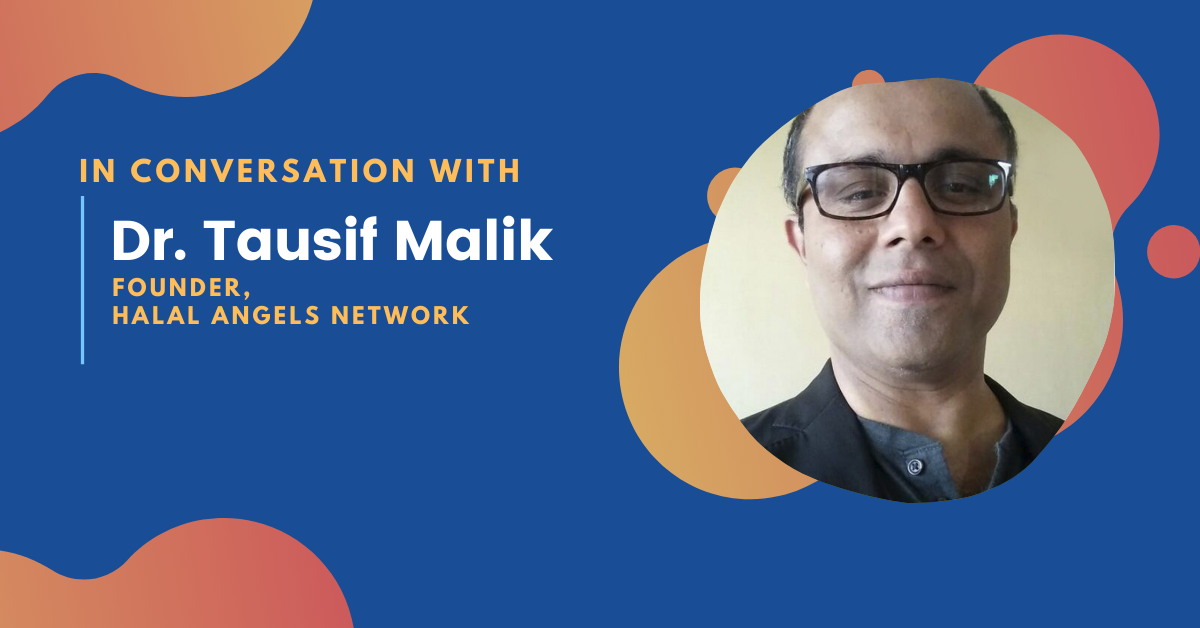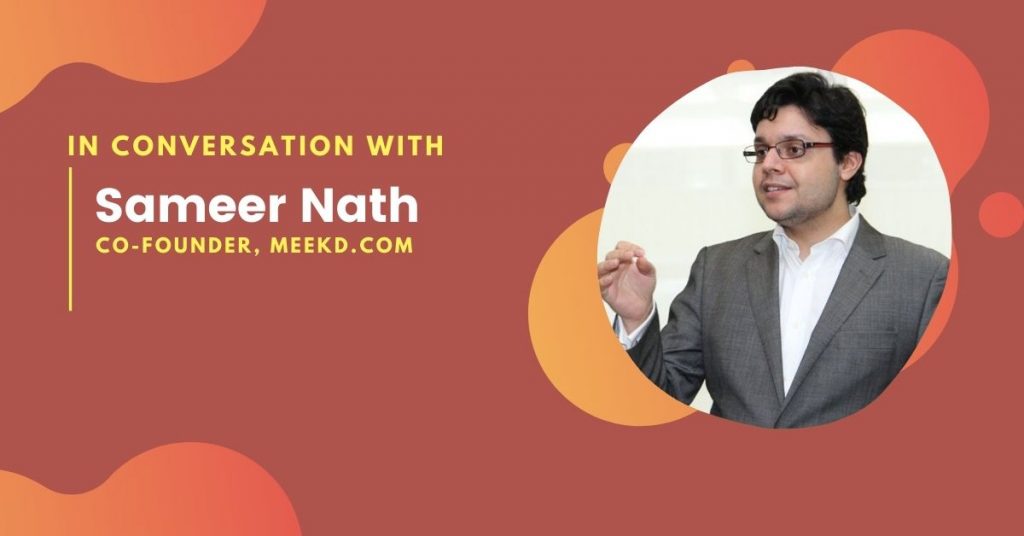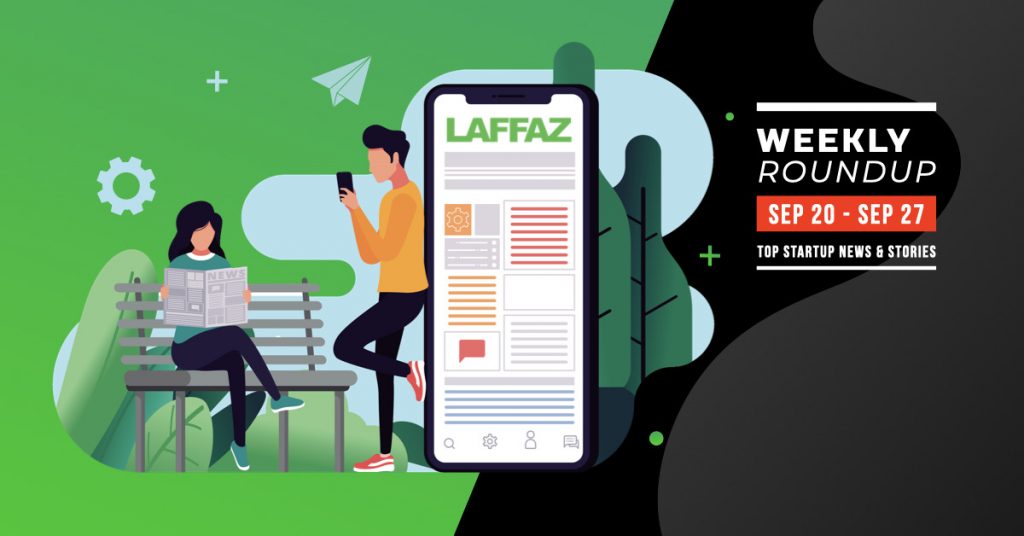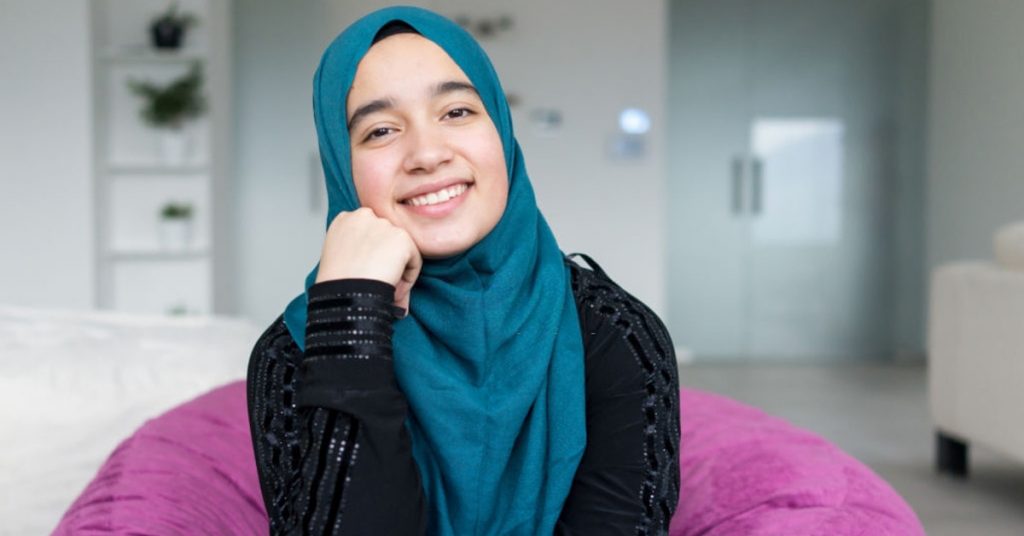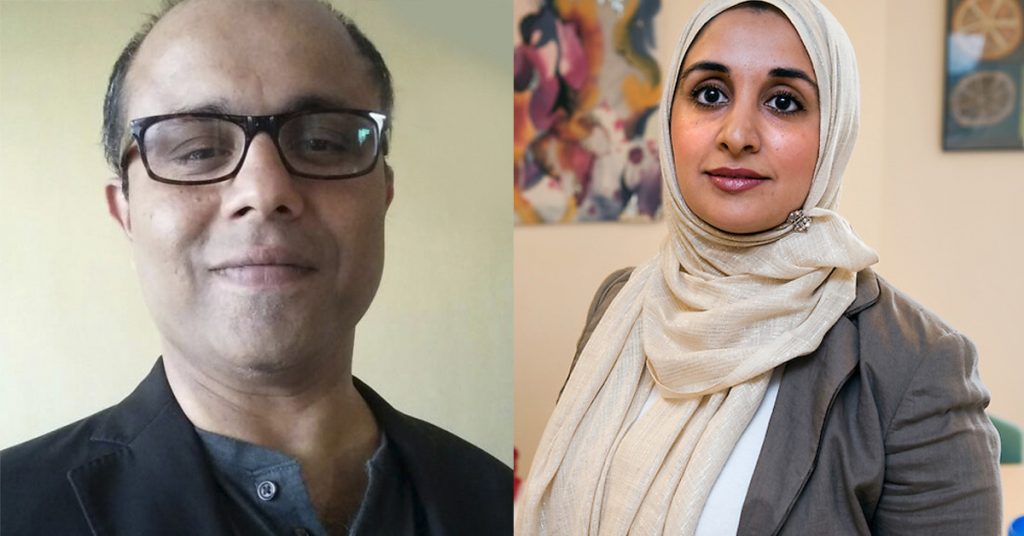The launch of the Halal Angels Network during COVID-19 crisis caught our attention and boosted our interest to dive deeper to know more about the Halal/Shariah investment. The concept is so unique, imagine ‘startups having shariah-compliant funding’, the market potential looks massive even without getting into stats and numbers.
Luckily we got an opportunity to interview Dr. Tausif, who is the founder of Halal Angels Network – enlightening us on how Halal angel investment is going to be an ideal choice for startups moving forward and its advantages.
Here’s to it!
LAFFAZ: Please tell us a bit about yourself, your early life, companies you’ve worked with, education, awards and achievements etc.
Dr. Tausif: I was born and raised in Pune, studied at Bishops School, Crescent School, Poona College (B.Com & M.Com), Institute of Management Education (IME)(PGDBM), Pune & Argosy University-Chicago, USA Doctorate in Business Administration (DBA) thesis Online Purchase and Impact of Word of Mouth (WOM).
As a child, I spent most of my time at my maternal grandparents’ house. My maternal grandfather Shaikh Ebrahim, who was a self-made successful businessman, so most of my business traits I learnt from him and my maternal Uncle Shaikh Ishaque, who was a scholar and a businessman, I grasped from him my Islamic education and how to respect humanity.
I did various odd jobs in my teenage years as I have been a hustler but finally I was advised by my late teacher Prof. Saadi Hassan to embark my career in the advertising industry and this really worked in my favour.
My first successful venture was when he created the recruitment advertising branding format for IT companies in the year 1994; which has become an industry standard now. My mentor, my manager Iftekhar Pathan, my MD Mrs. Vijaylaxmi Menon and team supported me in venturing in this space, where no one had ever tapped this market.
In the year 1998, I co-founded Crossover Technologies, an internet technology company with my late Prof. Saadi Hassan and India’s no #1 pop star Lucky Ali, and were the first company to demonstrate cable modem technology for internet access to ETH (Education to Home). In 2000, I exited from Crossover Technologies and went for a holiday in Dubai and ended up in GCC for over 4 years.
In GCC region, I worked with SIMPA Marketing Research, Oman’s leading research company and established Oman’s first PR Company SIMPA PR and Press Club of Oman. This achievement was recognized by the Government of Oman and I was invited to co-author a book called “Doing Business with Oman” co-published by the UK Government.
Later, I worked with the independent advertising powerhouse, Al Hudhud Adversing and learnt a lot from the founders late Bassam Hassouna, late Micheal Hilton and Dr. Naser Zumor.
Then I decided to come back to India in 2004, then one day I received a call from Dr. Godbole, the Director of Symbiosis Institute of Business Management to teach international branding case studies and this led to teaching gig at prestigious institutes Suryadatta Group of Institutions, Symbiosis Institute of Business Management, Pune, Balaji Management Institutions, Pune & Indira Group of Institutions.
I have also been an external review committee member at the University of Wisconsin, and USA School of Architecture.
Over the years I have lived and worked in different countries that gave me exposure to various ideas and experiences which helped in launching my own businesses.
In the year 2007, I immigrated to USA but this was the challenging time to immigrate as the great recession or global meltdown had just began. I lost my entire savings, I had to re-build my life, so I started working at a shoe store, driving cab and it was during the month of Ramadan. I prayed to Allah SWT and I was blessed with the Muslim Spelling Bee competition idea that became a turning point of my life. Muslim Spelling Bee competition emerged as one of the largest Spelling Bee competition of America.
I studied the Muslim consumer market and ended up doing my Doctorate in Business Administration, American Muslim’s Online Purchase and Impact of Word of Mouth (WOM).
I also founded the world’s first and largest bitcoin mining training program in association with the Dalit Indian Chamber of Commerce & Industry (DICCI). The sole objective was to promote and create a talent pool in future technologies creating sustainable development through ‘Reverse Migration’. But unfortunately, we had to stop this project as there was no regulatory framework for cryptocurrency in India.
In 2019, I was appointed as the first Global Chair of Muslim Democrats Abroad, to establish country chapters, support and educate about Democratic Party of USA to Non-Resident Americans and their right to vote from abroad. I was elected as a treasurer to the Democratic Party USA’s India Chapter (Democrats Abroad India). The reason I got active in politics was to fight for universal healthcare and education as many Americans suffer because of astronomical healthcare and education costs, many go bankrupt because of this.
I founded AIMBSN.com, India’s only ecosystem to connect with the Indian Muslim Entrepreneurs, Businesses, Investors & Startups and MAHAft (Maharashtra – Future Technologies) is the only platform to promote investment in the “State of Maharashtra & INDIA” as the ideal destination for investment in Future Technologies such as Blockchain, Fintech, IoT, Machine Learning & Future Technologies.
I recently have launched the world’s first Halal Angels Network – targeting $5 trillion Halal Consumer market in a move to support the Government of India’s $5 Trillion GDP target till 2024.
I was nominated and shortlisted for Ellis Island Medal of Honor, USA; Global Islamic Economy Award, promoted by His Highness Sheikh Muhammad Al Makhtoum, the ruler of Dubai, and the Prime Minister of UAE Dubai Government in association with Thompson Reuters. I have been a panelist for The Guardian Newspaper, UK
LAFFAZ: What triggered the idea of Halal Angels Network and what motivated you to start and scale it?
Dr. Tausif: The idea behind establishing the world’s first Halal Angels Network was to promote Innovation, Entrepreneurship and Startups to tap the $5 trillion, Halal consumer market and would grow to USD 9.71 trillion by 2025. It was launched during the COVID-19 pandemic to help investors, businesses, entrepreneurs & startups overcome these challenging times.
The Halal consumer has been identified since two decades, but since last decade; many have attempted to tap this market through establishing Halal certifications, Expos, Financial services, Manufacturing etc. But in a focused approach no one attempted to tap the startup industry. There are two ways of funding a startup either through Venture Capital route or through Angels Network. In Venture Capital method investors pool in a venture fund and the fund managers invest into the startups. In Angels Network, the Angels directly or as a group of individuals invest in a startup.
We felt the best way is to create a platform where Angels and Startups interact, in that way we are not taking investors money in our fund and investing, this helps in reducing bias and responsibility. By mistake, if we make any wrong decision in investing other peoples’ money in a startup, it would affect our credibility in this world and bad record on the judgement day.
LAFFAZ: How is Halal angel investment different from conventional angel funding and venture capital?
Dr. Tausif: Halal Angels Network is an Angels Network, but different from PE/VC firms; as we are a network where angels and startups connect on a platform and investments are made.
LAFFAZ: With Halal Angels Network, who is your target audience, and what’s the market size?
Dr. Tausif: We have identified sectors such as future technologies (Blockchain, Fintech AI, etc), Modest Fashion & Cosmetics, Retail, Pharmaceuticals, Food Cafe & Restaurants, Processed Food & Tourism for investments. As shariah-compliant investments play important, hence Fintech & Blockchain would be the investment focus.
According to Reuters, “the Halal consumer market is valued at $5 trillion and would grow to USD 9.71 trillion by 2025. The economic development of leading Islamic countries such as Indonesia, Malaysia, India, Pakistan, Nigeria, and Iran is expected to boost the global halal products market to reach over in the coming years”.
According to a report published by Wamda, “Comprising halal food, travel, cosmetics, modest fashion and Islamic finance, demand for goods and services that align with Islamic principles is on the rise, but just $745 million in disclosed private equity investment was invested in the Islamic economy over three years, far less than the $595 billion in private equity and venture capital investments that occurred globally in 2017.”
Muslim communities are as technology savvy as any other, especially their younger members who form part of the global rise of ‘millennials’ and their forward-thinking, and ‘can-do’ mindset. With the breaking down of borders through digital platforms, it is easier than ever for Islam-centric entrepreneurs to access the global Muslim population of 1.7 billion people (Gulf Business).
India is the biggest manufacturer of Halal consumer goods and has huge market opportunities in the Middle East, North Africa, and Southeast Asia. 15% of Indian population is Muslims and they can participate by their contribution of $1 trillion in the Government of India’s vision of $5 trillion economy by 2024.
LAFFAZ: Do you consider Halal investment as a better alternative to traditional funding?
Dr. Tausif: According to Capital Via research and market insight, Halal or Shariah stocks have been successful in delivering 39%* ROI to Bursa Malaysia traders with the help of recommendations for Halal or Shariah stocks. This not only the case in Malaysia but across the globe, where the debt to equity ratio is in favour of equity with less or no debt the valuation of the company jumps higher with great returns on investments. A classic example is Apple, where they have zero debt and their stocks have constantly delivered higher returns.
Hence Halal or Shariah stocks are great investments. Taxations are decided by governments and if we are promoting the concept of Halal, we encourage everyone to abide by the rules and regulations of the country and pay their due taxes.
LAFFAZ: Halal angel investment is definitely a likeable avenue for the Middle East as a result of the growing trend of the same there. So, are you projecting any plans for the Middle East or the MENA market entirely?
Dr. Tausif: Historically, the citizens of the MENA region have been engaged in the trade & commerce, established the Silk Route and Maritime Knowledge for global trade and also Islam encourages to pursue ‘Tijarat’.
Based on the research from various sources, the Middle East startup market is valued at 1.8 Trillion USD. GCC region has been the epicentre for entrepreneurs for decades, where people have made a fortune from no taxation policies, backed great infrastructure and vision of the leadership.
GCC rulers have always invested in the people, education, healthcare, infrastructure. The founding fathers and the current rulers’ initiatives have been bearing fruits for decades as many have prospered as entrepreneurs in the GCC region and the investments they made back home.
As mentioned, this gives a Halal angel investment definitely a likeable avenue for the Middle East and therefore we plan to work with different organisations to collaborate to connect investors and startups. We are also planning to host our events ‘Halal & Ethical Finance Summit’ & ‘The Khadija RA Initiative’, the World’s largest Cohort, Incubation & Acceleration program for 1001 Female Entrepreneurs. Insha Allah !!!
LAFFAZ: Would you like to share your core-cognition behind partnering with various fintech majors including UK’s Delio, Tanzania’s SSC Capital, Halal Board India, and Halal Laboratories in India?
Dr Tausif: Based on our vision and strategy we choose partners such as UK’s Delio, Tanzania’s SSC Capital, Halal Board India, and Halal Laboratories in India.
For Delio, we quickly saw the opportunity to streamline the investment process in this market and in Delio we have found the innovative tech partner to help us achieve this goal. Delio’s proven private markets technology will enable us to make these opportunities available on a digital platform, helping angels across the world to connect and support businesses that will not only benefit the economy but that are sustainable and socially responsible.”
We partnered with Halal Laboratories in India because of our experience in past working with Dr. Nejam Rehan, we felt that Halal Board India & Halal Laboratories was the right partner to evaluate projects for being Halal & Shari’ah compliant.”
Dr. Nejam Rehan promoted Halal Board India & Halal Laboratories offers a unique combination of Islamic, business & scientific experience & expertise to evaluate projects.
About our partnership Tanzania’s SSC Capital, according to Brookings Institute “More than 80 percent of Africa’s population growth over the next few decades will occur in cities, making it the fastest-urbanizing region in the world“. In total, we expect annual spending by African consumers and businesses to reach $6.66 trillion by 2030, up from $4 trillion in 2015.
Hence, we felt the need to tap this untapped market as traditionally North America, Europe & Asia are always in the news regarding startups and investments.
But the most important part of the strategy was to follow Prophet Muhammad’ (PBUH) teachings as he said to the first Muslims to do Hijarat to Ethiopia (Abyssinia), where they would “find a king there who does not wrong anyone.” It was the first hijra (migration) in Islam history. Hence, Masha Allah, we embarked on our journey based on this and trust me the response has been the most overwhelming, we would be signing up different organizations in pan African region.
LAFFAZ: It’s a matter of fact that financial institutions across the Middle East have worked on creating Shariah-compliant opportunities for startups amid the COVID-19 pandemic scenario. Do you think the same trend will be followed post-COVID-19? Does Halal investment option have the potential to make a mark in the Indian startup ecosystem too?
Dr Tausif: Yes, financial institutions across the Middle East would continue post-COVID-19, as everyone has to work extra… to leap forward from this situation.
Yes, Halal investment option has a great potential to make a mark in the Indian startup ecosystem, 15% of Indian population is Muslims and they can participate by their contribution of $1 trillion in the Government of India’s vision of a $5 trillion economy by 2024. India’s geographical location and historical ties with MENA, Central Asia and South Asia give a great advantage to become a global manufacturing hub for Halal products. In fact, there are many non-Muslims who are already manufacturing Halal products example Iba Halal Care, India’s first halal cosmetics brand was launched by two sisters Mauli Teli & Grishma Teli.
LAFFAZ: What are the DOs & DON’Ts would you like to list down regarding startup funding for newbie and entrepreneurs or Pre-Seed stage startups?
Dr. Tausif: Well this is a very good yet extensive one. I would like to keep it concise and graspable. Here are the DOs and Don’ts of startup funding that I would like to suggest to beginners.
- Firstly don’t copy any body’s idea
- Define your idea
- Develop a business plan
- Be bootstrapped
- Build clients, Don’t waste time chasing investors
- Constantly build a customer base
- Use revenue and profit wisely
- Use funding wisely
- Be honest to your customers & suppliers, they refer you to their network
- Never forget people who supported you in your journey
- If you fail, don’t stress maybe the idea was not profitable, maybe you didn’t work, maybe not in your destiny
- Be good to your parents, their blessings are very important.
LAFFAZ: A little generic one, especially for the newbie and aspiring entrepreneurs. Can you describe a few mistakes which most of the startup founders commit these days and how one could prevent those?
Dr. Tausif: There can be ‘n’ number of mistakes which beginners make, most common of them all which i have experienced while working with many young minds are:
- They think their idea is the best one, accept criticism and build a better product and service.
- They chase investors but don’t build a customer base
- After some time they lose energy and focus. Be focussed always!
- When money comes in the form of revenue, they spend, save as much as you can.
- When investment comes, they think that they achieved success and become complacent and lose steam
LAFFAZ: We would like to thank you for buying out time for this interview and enlightening our readers about the scope of Halal angel investments.
Dr. Tausif: I would like to thank LAFFAZ team for letting entrepreneurs and startups leverage a global audience. A small act during this COVID-19 pandemic is a great support and motivation. LAFFAZ’s support and offerings are inspiring and remarkable.
ⓘ LAFFAZ is not responsible for the content of external sites. Users are required to read and abide by our Terms & Conditions.
